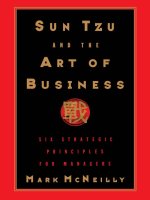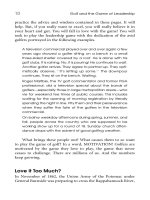Golf and the game of leadership 24
Bạn đang xem bản rút gọn của tài liệu. Xem và tải ngay bản đầy đủ của tài liệu tại đây (224.21 KB, 10 trang )
220
Golf and the Game of Leadership
counsel my participants to have at least a couple of suggestions
for the boss, based on group discussions that can be of help to
him or her and to the organization. You know, meet fire with fire,
coach!
Do not be dissuaded by the pessimistic cynics who question
your motives and actions, and those of others, to do the right
thing. Cynics are certainly sometimes right in their views. They
are also often not realistic in their thinking. Most assuredly they
waste a lot of energy on their negative approach to life and leader-
ship. Stay positive. You’ll feel better and come out on top in the
long run.
The 100th Monkey
Fact, fiction, or folklore, there is a story told of a young mon-
key living on an island with a colony of monkeys. Sweet
potatoes, which grew on the island, were the staple food
of the monkeys. The monkeys would scoop them up, cov-
ered with sand and dirt, and eat them. That is, except for
this one female monkey. She would take her sweet potato
to the water’s edge and wash it off. Then she would eat it.
Her siblings and others derided her, in monkey-talk of
course, ‘‘Why are you so foolish as to take the time to wash
your sweet potato?’’ And she would reply, ‘‘It tastes better,
that’s why.’’
Time went by, months and then years, and as the story
goes the young monkey began to convince other mon-
keys of the wisdom of washing the sweet potatoes. First
one, then ten, then fifty joined her. Now, for purposes of
example, assume there were 300 monkeys on the island.
The number of monkeys washing their sweet potatoes
reached 99. The next day the 100th monkey, and all the
other monkeys, began to wash their sweet potatoes!
The 100th monkey represents the concept of critical mass:
Reach a certain point of action and you cannot stop the
reaction from occurring throughout the mass. The concept
of critical mass is fact and not a monkey story. It took a
.......................... 10589$ CH18 02-23-04 16:45:46 PS
221
It’sUptoYou
long time but our young monkey knew the proper way to
eat a sweet potato. She stuck to her guns until she had
carried the day with the other monkeys. It’s up to you to
exercise the same patience and positive attitude in seeing
that the right things get done. Get critical mass on your
side.
Will You Be the One?
My hope is that at least one of you becomes a more effective
leader as a result of having played the 18 holes of the Global Lead-
ership Course. If so, I will consider my work a success. It will only
be a success for you if you are the one. It’s up to you to identify
and work on those ideas that will improve your leadership game.
Just like the game of golf! Remember, in both the game of golf
and the game of leadership, you must play your own ball. If you
don’t, you aren’t golfing, and you certainly are not leading!
One evening an old Cherokee told his grandson about
a battle that was going on inside himself. He said, ‘‘My
son, it is between two wolves. One is evil: anger, envy,
sorrow, regret, greed, arrogance, self-pity, guilt,
resentment, inferiority, lies, false pride, superiority, and
ego. The other is good: joy, peace, love, hope, serenity,
humility, kindness, benevolence, empathy, generosity,
truth, compassion, and faith.’’
The grandson thought about it for a minute and then
asked his grandfather, ‘‘Which wolf wins?’’ The old
Cherokee simply replied, ‘‘The one I feed.’’
Author Unknown
Quick Tips for Improving Your Leadership
Game
Real leaders typically understand and model the following in their
day-to-day actions:
.......................... 10589$ CH18 02-23-04 16:45:47 PS
222
Golf and the Game of Leadership
■
Build a history of competence and reliability. Finish what
you start.
■
Behave as if you are in business for yourself. Ask yourself,
‘‘If this were my ice cream store what would I do, what
would I expect others to do?’’ You know, in reality, your
career is your ice cream store!
■
Don’t just talk a good game, play a good game!
.......................... 10589$ CH18 02-23-04 16:45:47 PS
The 19th Hole
Wisdom and strength come from the courage to see
things as they are.
Lao Tzu, ancient Chinese philosopher
Congratulations! You’ve played the full 18.
Pour your favorite libation, sit down and put
your feet up, it’s time to reflect on your round.
The Global Leadership Course is a tough layout. The fairways are
narrow, the rough is U.S. Open deep, and the pin settings on the
greens are in difficult-to-reach positions. And, of course, sand,
water, and trees do not make your shots any easier. But that’s the
game of leadership in today’s world, a tough game to play.
As we mentioned back ‘‘On the Practice Tee,’’ the intent of
this book is to be helpful to you, the leader of people. I’ve tried
not to be academic but to provide thoughts and suggestions that
are useful and easily understood. In fact, I’ve tried to live up to the
nickname given me by one of my high school teachers: ‘‘practical
McHugh.’’
Golf is a metaphor for leadership. I hope you have come to
agree with me. As a result, if you are a golfer, you may think
more about your leadership as you play golf. Some of my caddies
(critical helpers) in this effort have even said there are lessons in
the book that will help them on the golf course! If you are a leader,
and not a golfer, you may think more about golf as you lead and
be a better leader for it. Many people are counting on you to play
the game of leadership to the best of your ability. You can do it!
223
.......................... 10589$ CH19 02-23-04 16:45:48 PS
224
Golf and the Game of Leadership
Hopefully, this book has provided some down-to-earth wisdom
to help you play the tough holes as well as the easy ones.
We should take some time now to reflect on the 18 holes
we’ve just played. You know, replay the holes on the videotape of
our mind’s eye. How did you score? What did you learn about
your game? How have you been reinforced in your approach to
the game? What do you need to do to be able to more effectively
play the ‘‘leadership game?’’
Serious golfers at this point will complete a ‘‘basic round
chart,’’ a typical format of which is shown in Figure 19-1.
As you can see, the chart covers the various elements of a
round and the golfer records his or her performance on each hole.
The golfer then reviews it and determines the areas of opportunity
to improve and what might be done to achieve the desired im-
provement.
Over 100 years ago, James Braid, winner of five British Opens
and designer of Gleneagles and many other famous Scottish golf
courses, wrote in his Golf Guide and How to Play Golf:
Golf [Leadership] is a game requiring an enormous amount
of thought, and unless the player can always ascertain exactly
what is the reason for his faults and what is the reason for his
method of remedying them he will never make much progress.
The more he thinks out the game for himself the better he will
get on.
1
Serious leaders should periodically prepare a ‘‘basic round
chart’’ to assess how they are playing the game of leadership. You
can make your own individualized chart. As an example, Figure
19-2 is a ‘‘basic leadership round chart’’ based on the selection of
a key concept from each of the 18 holes of the Global Leadership
Course that you just completed. Each hole is a par 4, for balance
and ease of scoring. I suggest you assess your play on each hole
and objectively score yourself. Scoring opportunities are par 4 (ac-
ceptable), birdie 3 (very good), eagle 2 (terrific), bogey 5 (close,
but), and double bogey 6 (get help). Total your scores and mea-
sure the overall round against par 72.
.......................... 10589$ CH19 02-23-04 16:45:49 PS









